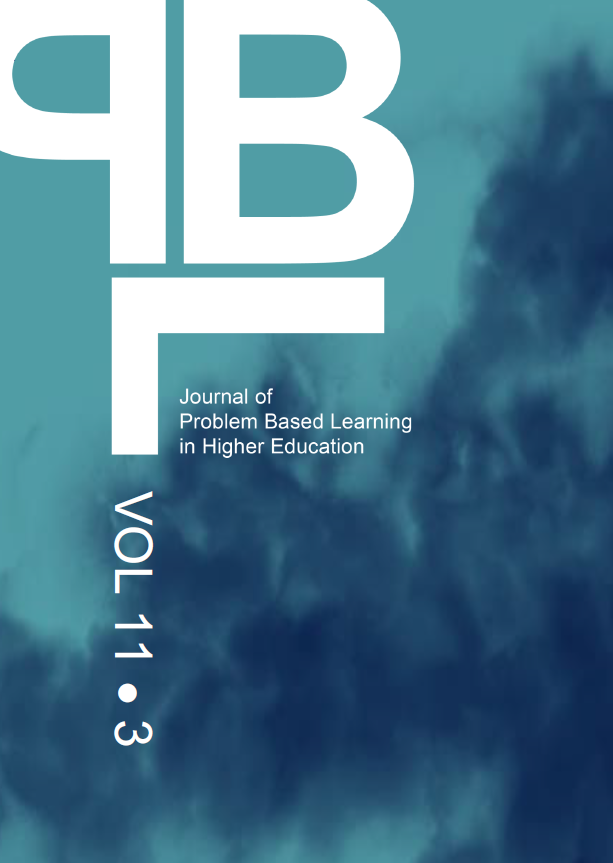Abstract
This work provides inspiration to foster Problem-Based Learning (PBL) in teaching practices related to waste management. Problem-Based Learning is about providing a learning environment where students can work practically and theoretically with problems of relevance for society. In this learning process, students themselves will define societally important problems and direct the problem identification, problem analysis, and problem-solving processes. The PBL approach at the engineering and technical faculties at Aalborg University acts as a case of inspiration to exemplify how the structure of a problem-based project can foster students’ competencies and agency to contribute to a circular economy related to waste.
References
Bitsch Olsen, P. & Pedersen, K. (2008). Problem-oriented project work: A workbook (2nd edition). Roskilde University Press.
Bocken, N. M. P., De Pauw, I., Bakker, C., & Van Der Grinten, B. (2016). Product design and business model strategies for a circular economy. Journal of Industrial and Production Engineering, 33(5), 308–320. https://doi.org/10.1080/21681015.2016.1172124
Ezeah, C., Fazakerley, J. A., & Roberts, C. L. (2013). Emerging trends in informal sector recycling in developing and transition countries. Waste Management, 33(11), 2509–2519. https://doi.org/10.1016/j.wasman.2013.06.020
Ferronato, N., & Torretta, V. (2019). Waste Mismanagement in Developing Countries: A Review of Global Issues. International Journal of Environmental Research and Public Health, 16(6), 1060. https://doi.org/10.3390/ijerph16061060
Gregory, J. (2006). Facilitation and facilitator style. In P. Jarvis (Ed.), The Theory and Practice of Teaching (0 ed.). Routledge. https://doi.org/10.4324/9780203016442
Guerra, A. (2014). Problem Based Learning and Sustainable Engineering Education: Challenges for 21st Century. Department of Development and Planning, Aalborg University.
Guerra, A., & Holgaard, J. E. (2019). Contextual Learning for Sustainability. In W. Leal Filho (Ed.), Encyclopedia of Sustainability in Higher Education (pp. 1–11). Springer International Publishing. https://doi.org/10.1007/978-3-319-63951-2_340-1
Holgaard, J. E., Guerra, A., Kolmos, A., & Petersen, L. S. (2017). Getting a Hold on the Problem in a Problem-Based Learning Environment. International Journal of Engineering Education, 33(3), 1070–1085.
Holgaard, J. E., Søndergaard, B. D., & Kolmos, A. (2019). Guide og katalog til PBL progressive læringsmål: Forberedt for ENG og TECH (Progressive PBL learning objectives in the AAU curricula). Aalborg Centre for Problem Based Learning in Engineering, Science and Sustainability under the auspices of UNESCO.
Holgaard, J. E., Ryberg, T., Stegeager, N., Stentoft, D., & Overgaard Thomassen, A. (2014). PBL: problembaseret læring og projektarbejde ved de videregående uddannelser. (1st edition). Samfundslitteratur.
Kolmos, A., Du, X., & Graaff, P. de. (2009). Diversity in PBL – PBL Learning Principles and Models. In X. Du, E. de Graaff, & A. Kolmos (Eds.), Research on PBL practice in engineering education (pp. 9–21). Sense Publ.
Kolmos, A., Du, X., Holgaard, J. E., & Jensen, L. P. (2008). Facilitation in a PBL environment. In Facilitation in a PBL environment (Report 978-87-991994-8–8). UCPBL UNESCO Chair in Problem Based Learning.
Kolmos, A., & Kofoed, L. B. (2002). Developing process competencies in co-operation, learning and project management. In 4th World Conference of ICED.
Kristensen, H. S., & Mosgaard, M. A. (2020). A review of micro level indicators for a circular economy – moving away from the three dimensions of sustainability? Journal of Cleaner Production, 243, 118531. https://doi.org/10.1016/j.jclepro.2019.118531
Mills, C. W. (2000). The Sociological Imagination. Oxford University Press; eBook Collection (EBSCOhost). https://search.ebscohost.com/login.aspx?direct=true&db=nlebk&AN=316643&site=ehost-live
Negt, O. (1981). Soziologische Phantasie und exemplarisches Lernen: Zur Theorie u. Praxis d. Arbeiterbildung. (Sociological Imagination and Exemplary learning) (7. Aufl., 3. Aufl. d. ueberarb. Neuausg. 1975, 38.-40. Tsd). Europaeische Verlagsanstalt.
Olesen, S. V. S., Fisker, S. F., Kristiansen, L. H. F., Olsen, H. N., & Karlsen, A. (2016). Øget affaldssortering på Bornholm (Enhanced waste sorting on Bornholm) (By- Energi- Og Miljøplanlægning) [P2 Semester project: Sustainable Cities]. Aalborg University Copenhagen.
Sterling, S. (2014). Education in Change, in Education for Sustainability. In J. Huckle & S. Sterling (Eds.), Education for Sustainability (0 ed., pp. 228–244). Routledge. https://doi.org/10.4324/9781315070650
Tisserant, A., Pauliuk, S., Merciai, S., Schmidt, J., Fry, J., Wood, R., & Tukker, A. (2017). Solid Waste and the Circular Economy: A Global Analysis of Waste Treatment and Waste Footprints. Journal of Industrial Ecology, 21(3), 628–640. https://doi.org/10.1111/jiec.12562

This work is licensed under a Creative Commons Attribution 4.0 International License.
Copyright (c) 2023 Søren Løkke, Helle Nedergaard Nielsen, Jette Egelund Holgaard
